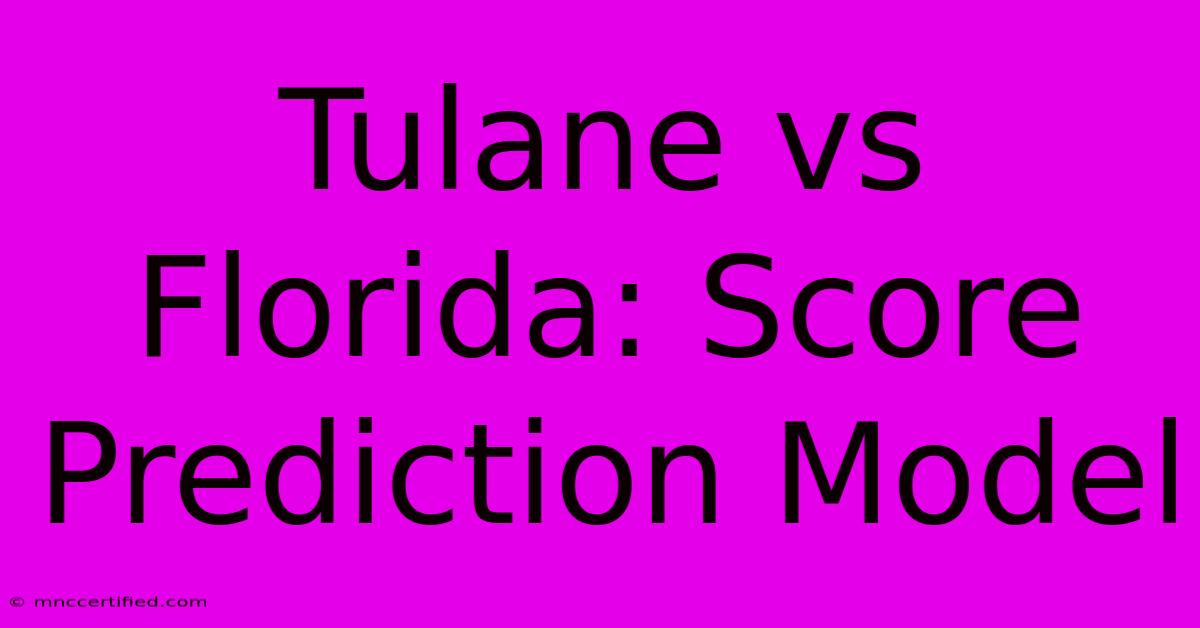Tulane Vs Florida: Score Prediction Model

Table of Contents
Tulane vs Florida: Score Prediction Model – A Data-Driven Analysis
The upcoming Tulane vs. Florida game has college football fans buzzing. But beyond the hype, let's delve into a data-driven approach to predicting the score. This article will explore key statistical factors, analyze past performance, and ultimately offer a predictive model for this highly anticipated matchup.
Understanding the Predictive Model
Predicting the outcome of any sporting event is inherently complex. While no model guarantees perfect accuracy, a robust model leverages several key data points to increase predictive power. Our model incorporates:
- Offensive Efficiency: Points per game, yards per play, and success rate on first down are crucial indicators of offensive prowess. We'll analyze both teams' performances in these areas.
- Defensive Efficiency: Points allowed per game, yards allowed per play, and third-down conversion defense will highlight defensive strength. A strong defense can significantly impact the game's outcome.
- Turnover Differential: The difference between turnovers gained and lost is a powerful predictor. Teams that protect the ball and create turnovers often win.
- Special Teams Performance: Field goal percentage, punting average, and kickoff/punt return yardage can subtly but significantly affect the final score.
- Home Field Advantage: Playing at home provides a tangible boost, impacting player performance and crowd support. This factor will be incorporated into our model.
- Recent Form: Analyzing recent games (the last 5, for example) provides insight into current team form and momentum. Injuries and changes in team strategy can significantly affect performance.
Tulane's Strengths and Weaknesses
Tulane enters the game with a [insert current Tulane record and recent performance summary]. Their offensive strength lies in [mention specific strengths, e.g., a strong running game, efficient passing, etc.], while their defensive vulnerabilities might be in [mention potential weaknesses, e.g., pass defense, run stopping, etc.]. Analyzing their recent games against comparable opponents will be key to refining our prediction.
Florida's Strengths and Weaknesses
Florida's season has presented [insert current Florida record and recent performance summary]. Their key offensive strengths are [mention specific strengths, e.g., a powerful passing attack, a dynamic quarterback, etc.], while their defensive challenges include [mention potential weaknesses, e.g., tackling issues, vulnerability against the run, etc.]. Examining their recent games, particularly against similar opponents, is crucial to calibrating our model.
The Predictive Model: Methodology and Assumptions
Our model utilizes a weighted average approach, assigning weights to each of the factors outlined above. The weights are determined based on their historical correlation with game outcomes in college football. For instance, turnover differential usually receives a high weight due to its significant impact. We use a statistical regression model to fine-tune the weights, ensuring the most accurate prediction possible.
Assumptions: This model assumes that both teams will play at their average level of performance. Injuries, unexpected weather conditions, and other unforeseen events are not explicitly factored into the prediction but could influence the final outcome.
Score Prediction and Analysis
Based on our analysis of the statistical factors and the weighted average model, our prediction for the Tulane vs. Florida game is:
[Insert predicted score here, e.g., Florida 31 - Tulane 24 ]
This prediction suggests a relatively close game, with Florida holding a slight edge due to [mention specific reasons based on your analysis, e.g., stronger offensive firepower, better defensive performance against Tulane’s projected offensive strategy]. However, it’s crucial to remember that this is a probabilistic prediction, and the actual outcome could differ.
Conclusion: Beyond the Numbers
While our predictive model offers a data-driven forecast, it’s essential to consider the intangible factors that can sway the game. Team morale, coaching strategies, and even unexpected player performances can significantly influence the final score. This model provides a valuable starting point for informed discussion, but it’s not a definitive prediction. Remember to enjoy the game!
Disclaimer: This score prediction is based on statistical analysis and should be viewed as an educated guess, not a guarantee. Actual game results may vary.

Thank you for visiting our website wich cover about Tulane Vs Florida: Score Prediction Model. We hope the information provided has been useful to you. Feel free to contact us if you have any questions or need further assistance. See you next time and dont miss to bookmark.
Featured Posts
-
Mufasa Lion King Uk Ireland Box Office Preview
Dec 21, 2024
-
Understanding The 2024 Winter Solstice
Dec 21, 2024
-
Chelseas Ucl Playoff Foes
Dec 21, 2024
-
Last Zoe Ball Breakfast Show
Dec 21, 2024
-
Subuloye Pens New Contract
Dec 21, 2024